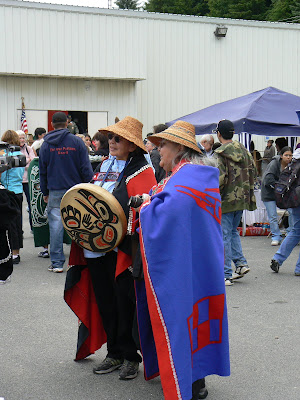
There is a small salmon hatchery on the Gunnuck Creek in Kake. Many Black Bears gather here when the salmon return to spawn.

They return to the place where they were born after approximately 4 years at sea in one of nature's most unique mysteries. By the time they reach their destination the males have been transformed changing the shape of their jaws and teeth to fight for spawning rights. Both male and female change color to red and orange as they begin the dying process after laying eggs and spawning.
This is a great opportunity for bears to bulk up for the long winter on the carcasses of the fish.

This one decided she better take care of "business" and she pushes with her front paws and wishes she had eaten more berries!

Looks like she is contemplating her plan of action.

This big gal just came to eat!

Mother Bear sent Baby Bear up the tree to stay out of the way.


When Baby Bear starts to slip she yells out for mother's help!

Mother Bear looks up in dismay and growls some instructions! Baby Bear manages to re-gain its balance.

Baby Bear confides in a young Bald Eagle about the perils of tree climbing.

Mother Bear is constantly teaching her young the survival techniques it will need when PaPa Bear returns and the young bear will be on its own.

It appears that Mother Bear is scolding a young teenage bear about something. We can hear the growls from the other side of the shore.

Whatever it was they disappeared into the forest!










































